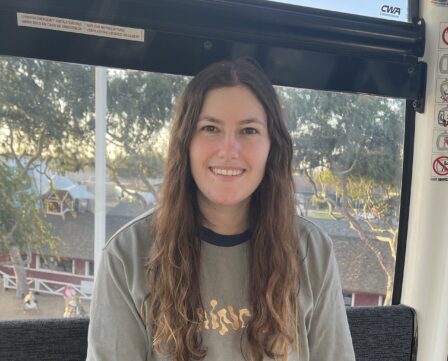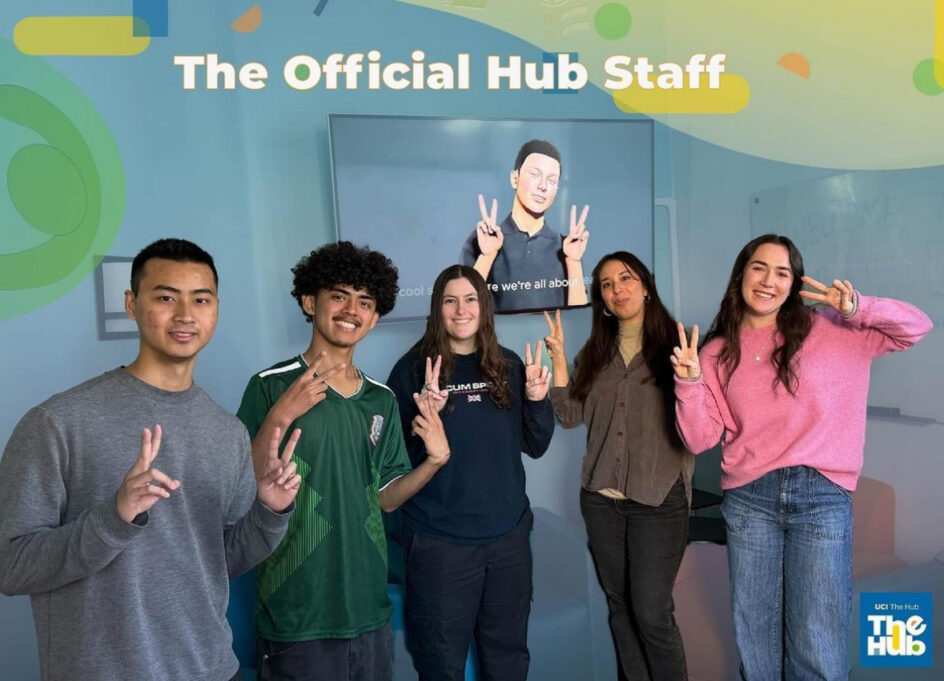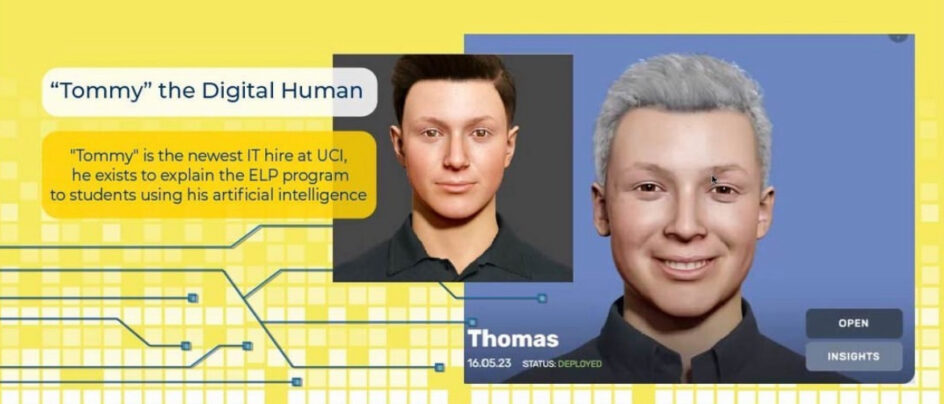Haley Marts Highlights the Benefits of Experiential Learning
Senior Spotlight: Computer science major Haley Marts enters the job market with hands-on experience working with AI.

In just a few months, Haley Marts will graduate from UC Irvine with a B.S. in computer science. As she prepares to start her professional career, she brings with her a wealth of foundational skills and hands-on training gained from her coursework in the Donald Bren School of Information and Computer Sciences (ICS). She also has real-world experience as a Data and Technology Fellow for the Experiential Learning Program (ELP), an initiative of UCI’s Office of Data and Information Technology (ODIT). ELP aims to bridge the gap between classroom learning and career readiness, giving Marts the opportunity to collaborate with industry experts, build AI technology, conduct market research and use data-driven techniques to identify new business models. Here, Marts talks about her work to develop a digital human and how the experience greatly enhanced her ICS education.
What first sparked your interest in computer science?
My initial attraction to computer science stemmed from a desire to challenge myself and excel within a STEM field. I began my academic journey at a community college, which provided me the opportunity to explore various majors before transferring to UCI. I found myself torn between mechanical engineering and computer science. However, by my second year, it became clear that computer science was more aligned within my interests. The complexities and challenges of programming particularly appealed to me, offering a stimulating problem-solving environment. Also, I’ll admit that the prospect of having a career that accommodates remote work enhanced its appeal.
Have you had a favorite class or professor at UCI?
If I had to choose, my favorite class would be Compsci 147: Internet of Things (IoT) Software and Systems. The hands-on experience of working with a Raspberry Pi was pretty fun. Also, I’d say the AI courses I’ve taken have been equally fascinating.
When it comes to faculty, Michael Shindler stands out as my favorite professor. His amazing teaching style, deep knowledge of the subject matter, and genuine care for student success have made a lasting impression on me. He’s an outstanding educator and mentor.
Can you talk about being a Data and Technology Fellow?
Being a Data and Technology Fellow at UCI, particularly through the Experiential Learning Program, has been an amazing highlight of my university experience. It’s funny because initially, I was hesitant to apply, doubting my qualifications and experience in applying my degree in a practical work setting. However, deciding to take a chance and apply has seriously shaped my university experience for the better. This role has been instrumental in developing my time-management skills, enhancing my ability to work independently, and honing my research and problem-solving capabilities, especially when faced with unfamiliar challenges.

One of the program’s most remarkable aspects is its focus on hands-on learning about the AI industry. It’s insane that the ODIT department is effectively paying students to delve into areas they are passionate about. Working under the mentorship of the Vice Chancellor of ODIT, Tom Andriola, has been an incredibly rewarding experience. His guidance and the opportunities to engage with his team have been immensely educational. This job has allowed me to attend various events and expand my professional network, and it ultimately played a pivotal role in molding me into the professional I am today. Special thanks to Xanat Hernandez, Tom, and the entire team for their incredible work and for fostering an environment that values student involvement. Their commitment to getting students into meaningful projects is truly amazing!
What was the main project you were involved with?
The project involved building a chatbot named Tommy, aimed at transforming user interaction on the UCI ODIT’s website by replacing the traditional chat box with a more engaging, digital human interface. Tommy has also been created through the production of multiple video assets, where we fed scripts to our digital humans, resulting in highly customizable and human-like videos. This has allowed for extensive testing and showcasing to various audiences, demonstrating Tommy’s potential to enhance digital communication. While we’ve made significant progress, the full integration of Tommy into the UCI ODIT’s website as a replacement for the existing chat box is still underway.

What was it like working to create a digital human?
Working to create a digital human using the Soul Machines platform has been amazing. The platform offers an academy filled with comprehensive tutorials, guiding users through the process of designing and developing digital humans. This structured learning path allowed me to experiment with their Digital DNA Studio, where the creation of digital personas comes to life. Initially, navigating the intricacies of the platform was challenging, but as I delved deeper, my proficiency and engagement with the technology grew.
This project served as an amazing learning experience, equipping me with skills in project management, conversational design, and engineering, as well as the art of persona creation. The opportunity to apply creativity — coupled with the practical learning of tools such as Google Dialogflow and CapCut — has been so rewarding! Additionally, witnessing my creations come to life at various events has been hands-down the coolest part of my job. This experience not only aligns with my major but also offers a taste of the real-world applications of my studies.
What excites you about the future of AI, and what concerns you?
What excites me most is the potential for groundbreaking advancements and the revolutionary technologies it promises. I can’t wait to see the ways in which we will adapt to integrate AI seamlessly into our daily lives, leveraging it as a powerful tool rather than perceiving it as a threat. The rapid progress of AI to date signals that we are only at the dawn of what AI can achieve. This evolution excites me because it foretells a future rich with innovation and breakthroughs that we can hardly imagine today.
However, my enthusiasm is tempered by concerns over job displacement. The prospect of AI advancing to a point where it renders numerous jobs redundant is definitely a worry of mine. Despite this, I like to maintain a positive outlook, believing in the overwhelming benefits AI brings to our society. It’s important to view AI as an ally in our progress, one that — while warranting cautious engagement — holds the promise of significantly enhancing our capabilities and human life.
Any advice for prospective students?
My best piece of advice for prospective students, especially those considering balancing work with their studies, is to seek employment within their university. The benefits are unparalleled. Universities are more accommodating when it comes to scheduling, prioritizing your education above all else. Many positions on campus experience periods of downtime, and supervisors are often supportive of students using this time to focus on coursework, as long as your work responsibilities are managed efficiently and to a high standard. This understanding creates a supportive work environment that genuinely respects and fosters academic success.
What are your future plans?
My immediate focus is on securing a job post-graduation. I am gearing up to prepare for interviews and intensify my job application process. I’m excited to transition into the professional world and apply my programming skills in the workforce, experiencing firsthand the challenges and opportunities that come with a career in technology.
In honor of Women’s History Month, can you share a woman in STEM who has inspired you?
Katherine Johnson has been an important source of inspiration for me, especially after watching her portrayal in the movie Hidden Figures, which first brought her story to my attention. As a pioneering African American mathematician, her contributions were vital to the success of the United States space missions. Her tenacity, brilliance and groundbreaking achievements in a field dominated by men, and in a time of significant racial barriers, make her an unparalleled role model. Her legacy not only celebrates her scientific achievements but also her role in breaking down barriers for women and people of color in STEM.
— Shani Murray